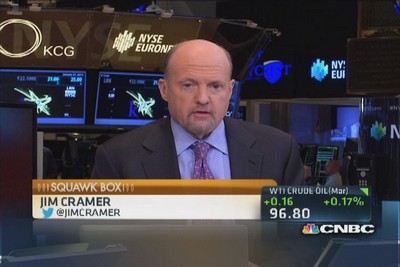Is China really running out of cash?
Published: Sunday, 26 Jan 2014
By: Leslie Shaffer | Writer for CNBC.com
Chang:m
Gordan Chang, Forbes.com columnist and Author of "The Coming Collapse of China," warns that China faces a new credit crunch as well as a domestic currency crisis.
Concerns a cash crunch might emerge in China resurfaced on Monday after Citibank's local website posted a notice that fund transfers of both dollars and yuan would be delayed, but it may just be a tempest in a teapot.
"This is part of our regular maintenance every year during the Chinese New Year period," Richard Tesvich, a spokesperson for Citigroup, told CNBC.
The fund transfer delay, initially reported in a Forbes column, spurred concerns of a potential nation-wide liquidity shortage. The link to the article appears to have since been removed from the Forbes website.
(Read more: China's shadow banking woes are 'exaggerated')
"The specific reason given – 'system maintenance' at the central bank – is preposterous," Gordon Chang wrote in the Forbes column. "Today's 'system maintenance' notice is a sign of a fundamental problem. Banks, in short, need cash to rollover ever-increasing amounts of nonperforming loans and wealth-management products," said Chang, who authored the book "The Coming Collapse of China," in 2001.
However, a bank officer at Citibank China told CNBC that customers can still make transfers through the end of the working day on January 30, right before the long Lunar New year holiday begins.

Ian McKinnell | Photographer's Choice | Getty Images
The bank officer noted the system maintenance is scheduled to coincide with the bank holiday, with domestic transfers delayed through February 2 and foreign currency transfers delayed until February 7, the end of the holiday.
(Read more: China central bank offers emergency funds to banks)
For his part, Chang isn't convinced by Citigroup's explanation.
"I know in the past they've had similar notices from the PBOC (People's Bank of China) before Chinese New Year. But they haven't been in the time of a credit crunch and therefore that's the critical difference," Chang told CNBC.
He noted there were similar moves in June during a credit crunch, with some large Chinese banks shutting down ATMs. "Clearly, then it was not a systems upgrade. It was a credit crunch. We saw a credit crunch in December. And so I'm saying that essentially we've got the same thing this time as well," Chang added.
Others have expressed skepticism of Chang's view.
China's doing quite well: Cramer
Don't start your trading day without finding out what CNBC's Jim Cramer is watching ahead of the opening bell. Today Cramer shares his thoughts on emerging market plays and underlying strength in China.
"If there was really a serious cash crunch, why do this thing on the 30th of January, why not do it now," asked Vasu Menon, vice president of wealth management for OCBC Bank in Singapore, adding that not only does the timing coincide with the bank holiday, but that banks frequently do system maintenance over holidays.
Menon told CNBC he believes the country's new government would step in to prevent a potential cash crunch.
(Read more: China's bad-loan skeletons to haunt markets)
Some general bearishness on China may be spurring these latest concerns
"The cottage industry of who's going to be the caller for the collapse of China has expanded," said Peter Alexander, managing director at Z-Ben Advisors.
While this particular fund transfer brouhaha may just have been a false alarm, others did note general concerns about China's banking system.
"We have heard in recent weeks of certain banks, out there in the region, the backwater, closing the doors because they're not able to provide cash for their investors," noted Gary Dugan, chief investment officer for Asia and the Middle East at Coutts.
He also noted news last week that one of China's high-yield trust investments appears set for what could be the first default on a principal repayment.
"There is a liquidity squeeze in China. We've had patches of this before, but the scale of what we're seeing at least on the screens at the moment is beyond the worst we've seen in the past," Dugan told CNBC.
Regulators' attempts to rein in excess liquidity in the system has spurred several large spikes in interbank lending rates in recent months, with the central bank needing to step in repeatedly to calm markets. On January 20, interbank rates spiked as high as 10 percent before the central bank intervened, from levels as low as around 3 percent in the previous week. It is currently around 4.65 percent.
Gartman: China remittances more serious than EM rout
Dennis Gartman, Founder, Editor & Publisher of The Gartman Letter, describes the extent of his concern over a Forbes report that China has halted bank cash transfers.
Last week, China's central bank provided emerging funding support to commercial banks in response to a surge in cash rates before the holiday, following similar moves in December.
(Read more: Are China bank stocks cheap or just crummy?)
The People's Bank of China also expressed concern about some banks' over-reliance on short-term funding markets and urged banks to improve how they manage their liquidity.
"We'll never understand how difficult it is to control China, particularly its financial system," Dugan said. "Even a well-intentioned government, as we believe they are, is finding it very, very difficult to control all of the things that are happening within the financial system and these stress points (and) bringing them under control and keeping the markets' confidence."
—By CNBC.Com's Leslie Shaffer; Follow her on Twitter
@LeslieShaffer1


No comments:
Post a Comment
Comments always welcome!